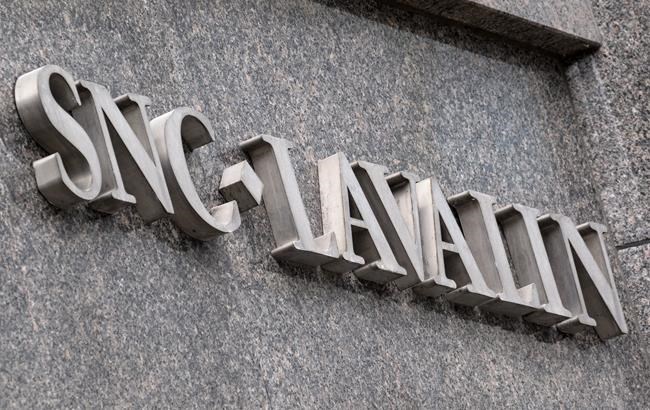The SNC-Lavalin legal saga was thrust back into the spotlight Thursday after the RCMP announced they've charged two former executives and the engineering company itself for allegedly paying bribes to obtain a Montreal bridge repair contract.
Former SNC-Lavalin vice-president Normand Morin and former SNC-Lavalin International Inc. vice-president Kamal Francis, along with SNC-Lavalin and its subsidiary, have each been charged with forgery, conspiracy to commit forgery, fraud, conspiracy to commit fraud, fraud against the government, and conspiracy to commit fraud against the government.
The two former executives have been released from custody and are due to appear in a Montreal court on Sept. 27 along with representatives from SNC-Lavalin and SNC-Lavalin International.
The Director of Criminal and Penal Prosecutions (DPCP) has agreed to send an invitation to negotiate a remedial agreement with SNC-Lavalin and SNC-Lavalin International Inc. The invitation went out on Thursday. Neither executive is eligible for such an offer.
Such a deal, a so-called deferred prosecution agreement, would allow SNC-Lavalin to continue doing business with the governments of Quebec, Canada and abroad.
"It also reduces the negative consequences on employees, retirees, customers and shareholders of organizations," the DPCP said in a statement.
SNC-Lavalin said it welcomes the opportunity to negotiate an agreement to resolve these charges that promote accountability while also permitting the company to continue to do business and protect the livelihoods of employees, clients, investors and other stakeholders.
''I want to emphasize that these charges stem from events that took place nearly 20 years ago, involving former employees who left the company years ago and who no longer have any involvement with our organization," stated CEO Ian Edwards.
He said the company has made great strides over the past decade and today operates at the highest ethical standards.
"We see this as a further step to put the past behind us and allow the company to focus on the future."
The RCMP said the charges are the result of a complex investigation dubbed Project Agrafe ("Staple") that started in 2013. It said the investigation was carried out by the Sensitive and International Investigations division of the force, which is mandated to investigate criminal activity that poses a threat to Canada's government institutions, public officials, the integrity of the Crown, or that imperils Canada's political, economic and social integrity.
Once the investigation was complete, the RCMP said it passed on its evidence to Quebec's Director of Criminal and Penal Prosecution to proceed with formalizing the charges and warrants of arrest.
The charges date back to events that took place between 1997 and 2004. Michel Fournier, former president and CEO of the Federal Bridge Corp., admitted to receiving bribes from SNC-Lavalin worth $2.23 million related to a $128-million Jacques-Cartier Bridge repair project through Swiss bank accounts. Fournier of Victoria, B.C., was sentenced to five and a half years in prison in 2017 and has since received full parole.
After retiring in 2004, Fournier created an offshore shell company in the Virgin Islands to bring the bribe money back to Canada, according to court documents. The government was only able to confiscate $775,000 of the bribes because Fournier lost a significant amount of money in the stock market.
SNC-Lavalin was previously charged with bribery and fraud in relation to its past work in Libya, which was at the centre of the high-profile 2019 battle between Prime Minister Justin Trudeau and then-attorney general Jody Wilson-Raybould.
In December 2019, the company reached an agreement in which its construction division pleaded guilty to a single count of fraud, accompanied by a $280-million fine, while other charges related to acts committed in Libya between 2001 and 2011 were set aside. The company retained the right to bid on federal government contracts.
SNC-Lavalin was an issue during the 2019 federal election and surfaced again in the election this year after Wilson-Raybould wrote a book that touched on the criminal prosecution of the company and her testimony that senior party leaders pressed her to halt the case for political reasons.
Trudeau said during the recent campaign that the matter had been thoroughly dissected in parliamentary committee hearings, newspaper articles and other testimony prior to the last federal election. He said the RCMP had never contacted him regarding the SNC affair.
The Liberals won another minority government on Monday.
Industry analysts downplayed the significance of the latest charges and potential penalty on SNC-Lavalin.
Yuri Lynk of Canaccord Genuity said the development doesn't diminish his "bullish stance on SNC in the least."
He said investors shouldn't be taken off-guard because alleged improprieties surrounding the company's involvement in the bridge have been in the news for years and SNC has warned that potential charges are a risk.
Lynk added in a report that the potential financial penalty shouldn't be significant given that the magnitude of the gains was small and SNC lost money on the project. The past fine of $280 million payable over five years was for $127 million in bribes, compared with $2.23 million in bribes in this instance.
"Based on this, we estimate a fine related to the Jacques Cartier Bridge would be in the tens of millions of dollars range," he wrote, noting that SNC has more than $660 million in cash.
"We view this as a bump in the road leading to SNC's recovery."
Analyst Maxim Sytchev of National Bank Financial said he expects a quicker resolution to these charges because SNC-Lavalin would want to quickly sit down with the federal government, whereas last time it was not invited to negotiate an agreement.
"Given the long-dated nature of the contract and its small size, we believe any charges would be commensurate with the infraction," he wrote in a note to clients.
This report by The Canadian Press was first published Sept. 23, 2021.
Companies in this story: (TSX:SNC)
Ross Marowits, The Canadian Press

